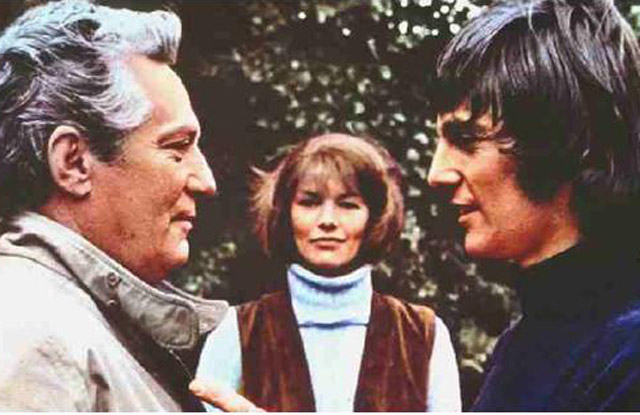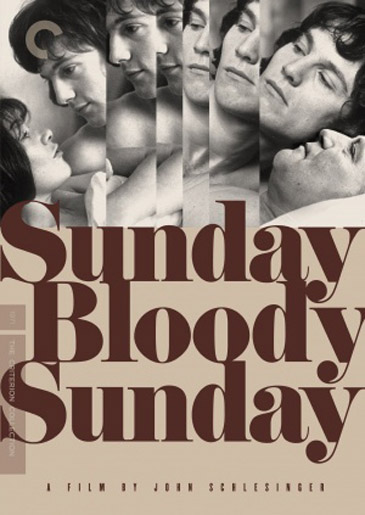CHICAGO – In anticipation of the scariest week of the year, HollywoodChicago.com launches its 2024 Movie Gifts series, which will suggest DVDs and collections for holiday giving.
Blu-ray Review: ‘Sunday Bloody Sunday’ Still Reflects Back to Us
CHICAGO – Relate the now iconic term “Sunday Bloody Sunday,” and most likely a off-tune rendering of the famous rock song by U2 will follow. But the title was originally expressed in director John Schlesinger’s groundbreaking film of 1971, “Sunday Bloody Sunday,” recently released on Blu-ray through The Criterion Collection.
 Blu-ray Rating: 4.5/5.0 |
The film has notoriety because it featured the first same-sex kiss between men in movie history (Peter Finch and Murray Head), but put aside that then-shocking expression and there is a psychologically complex film about unresolved relationship issues and identity. The drama is exquisitely cast, set against a post-Swingin’ 1960s London, when it seemed like the whole culture was waking up with a hangover from all that social change. Peter Finch, best known for his final role in 1976 of the mad news anchorman in “Network,” anchors this film with a passionate communication of middle age in both progress and regress.
The film centers around the activities of Daniel (Finch), a Jewish doctor who has all the trappings of success; Alex (Glenda Jackson), a job placement consultant in London; and Bob Elkin (Murray Head), a sculptor who is about to break out in America. Bob and Alex seem like a typical in-kind couple – they are first introduced volunteering to babysit their friend’s children – but when Bob takes a break to go to the city, it is revealed that he is having a relationship with the good doctor as well. This love triangle, that is acknowledge through all the parties, continues to simmer, until dissatisfaction starts poisoning the well.
 Photo credit: The Criterion Collection |
What about that famous kiss? Well, do it right or stay home (in production notes, Finch said he did it “for England”). Viewed from the era of gay marriage, it still packs a punch, given that it also comes at a surprising early point in the film. Murray Head – who most famously played Judas in the original rock opera recording of “Jesus Christ Superstar” – is the centerpiece of the triangle, loved almost desperately by Daniel and Alex. His nonchalance towards the two separate worlds, and his ability to jump between them, is a remarkable interpretation of what could have been a cartoonish character.
Peter Finch and Glenda Jackson, the other wheels in the tricycle of togetherness, are such craftsman as actors that they bring so much more to the cuckolded lovers than just frustration. They are both able to communicate their love for Bob, in the way that they relate to him, and still maintain a dignity in their own presence. There is a glorious scene where they take turns driving by Bob’s flat, and their separate expressions of longing are heart rending.
 Photo credit: The Criterion Collection |
Besides the kiss, there are some other unusual elements, stuff that wouldn’t necessarily be shown on film today (pot smoking children, anyone?), and that again distinguishes the era when the film was made – when art had a little more influence over distribution markets – as much as anything else. At the time of the film, John Schlesinger has just recently directed the Oscar-winning Best Picture, “Midnight Cowboy,” and although there are less cinematic “tricks” in this other film, it still has a sense of the anarchy and loneliness found in “Cowboy.” Schlesinger really knew how to create richness in his characters, so they would find a place beyond whatever surface emotion seems to define them. “Sunday Bloody Sunday” is a fine example of that sure hand.
The Criterion Collection, a gift to the cinema universe, doesn’t skimp on post film analysis. There are interviews with the principle players, including Schlesinger and Head, plus a documentary feature and a reflection from photographer Michael Childers, Schlesinger’s partner of over thirty years, who was with him all the way up to the director’s death in 2003.
The relatable quality of the film is in the relationships, those complex and often unwieldy quirks of our universal nature. Gay, straight or in a triangle, relationships will always create part of who we are, and the image of us will mark the other. In that context, a kiss is still a kiss.
 | By PATRICK McDONALD |


